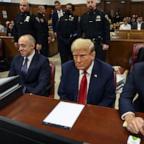BP Shares Sink After Senators Call for Escrow Fund
Some form of ownership change seen as likely, experts say.
June 14, 2010— -- BP shares dived again Monday in London trading after a group of U.S. senators asked the company to set up a $20 billion escrow fund to cover costs of the oil leak in the Gulf of Mexico.
Shares in BP declined 10 percent Monday afternoon in London to 352.65 pence and are down 50 percent since the April 20 accident. BP, No. 5 in sales worldwide on Forbes list of biggest companies, has seen its fortunes collapse in the wake of the spill. BP directors will meet today to consider cutting dividends to conserve cash.
On Sunday, 54 Democratic senators called in a letter for the company to set aside $20 billion in an escrow fund for cleanup and damages, to be administered by an independent trustee.
"Our mission is to hold them accountable in every appropriate way," Obama advisor David Axelrod said on NBC's "Meet the Press" Sunday. "[Obama] is going to be very clear about what our expectations are in terms of taking care of the people who've been damaged by this crisis."
BP shares have fallen sharply over chatter about a possible bankruptcy filing by BP amid U.S. political pressure on the company to halt dividend payments and pay even more compensation for the Gulf of Mexico oil spill. That might be extended to include unemployment benefits for thousands of U.S. workers affected by the spill.
The company's directors will meet in London today reportedly to discuss cutting the dividend.
Respected oil industry analyst Matt Simmons told Fortune Magazine last week that a BP bankruptcy filing was likely within a month. "They're going to run out of cash from lawsuits, cleanup and other expenses," he said.
"One really smart thing that Obama did was about three weeks ago he forced BP CEO Tony Hayward to put in writing that BP would pay for every dollar of the cleanup. But there isn't enough money in the world to clean up the Gulf of Mexico. Once BP realizes the extent of this, my guess is that they'll panic and go into Chapter 11."
Meanwhile, BP appeared to be mystified about the share decline. "The company is not aware of any reason which justifies this share price movement," it said in a statement on its website last week.
"BP faces this situation as a strong company. In March, we indicated that the company's cash inflows and outflows were balanced at an oil price of around $60/barrel. This was before the costs of the incident.Under the current trading environment, we are generating significant additional cash flow. In addition, our gearing is currently below the bottom of our targeted range."
The firm added: "Our asset base is strong and valuable, with more than 18bn barrels of proved reserves and 63bn barrels of resources as at the end of 2009. All of the above gives us significant capacity and flexibility in dealing with the cost of responding to the incident, the environmental remediation and the payment of legitimate claims."
In a widely circulated research note, London-based Abuthnot analyst Dougie Youngson wrote last week: "The key question now is whether BP, and not just BP CEO Tony Hayward, can survive."
Lysle Brinker, co-head of the equity department at IHS Herold, agreed that the oil giant is staggering. "In any scenario, from worst case to best case, there is a strong likelihood that BP will emerge from this situation with a much changed corporate and ownership structure than it had before," Brinker said. "You can't rule out bankruptcy or a takeover, but we think it is more likely that to compete going forward BP will need to take on some form of minority equity partner. A closer relationship with a large national oil company, possibly of Chinese origin, is a percentage-play scenario."
Most analysts, including those at the global banking behemoth Barclays Capital, steadfastly rejected the notion that BP could be toast, with some industry players even viewing BP's shares as attractive and already priced to reflect worst-case liability costs.
BP's liabilities are likely to exceed $20 billion factoring in the Justice Department's criminal probe , which could bring heavy fines, as well as a gusher of class-action lawsuits. Some estimates have reached as high as $40 billion, and are based on assumptions that the leak continues through the end of the summer, possibly worsened by hurricanes. The latest effort to contain the leak was said to be progressing well, the Coast Guard said.




